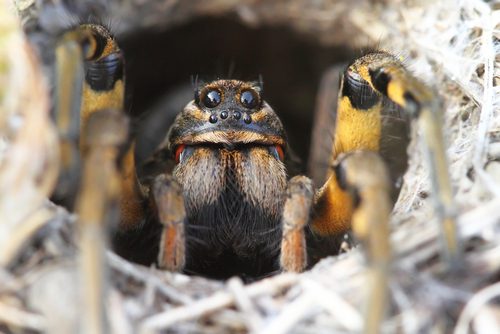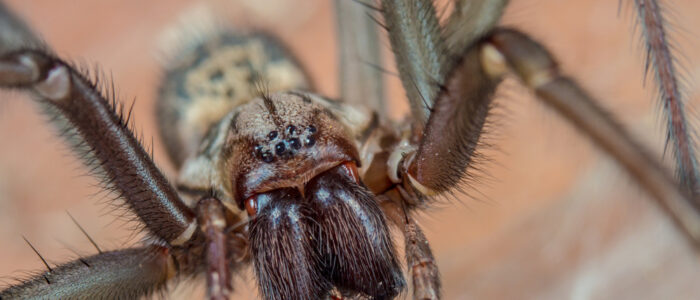Spiders, while fascinating, often stir fear and misconceptions. Today, we’ll uncover the truth behind some of the most prevalent spider myths and reveal the genuine “spider facts,” especially as they pertain to keeping spiders out of your home or business.
Trust the experts at Gregory for clear, informative facts about pests and for effective pest control when you need it.
10 Myths About Spiders
Gregory has been battling four, six and eight-legged pests for over 50 years. We’ve dared web and fang alike and we’ve come through with some hard-earned knowledge about our arachnid invaders. Think you know the full story? How many myths about spiders can you bust?
1. Myth: All spiders bite humans and are dangerous.
Spider Fact: While all spiders have fangs and produce venom, not all can bite humans or are harmful. For the most part, spiders produce only enough venom to subdue prey like flies and other insects. In the Southeastern United States, only two species pose any real threat. Those are the black widow and brown recluse.
2. Myth: Daddy longlegs are the most venomous spiders but can’t bite humans.
Spider Fact: Daddy longlegs, or harvestmen, can have six or eight legs and aren’t spiders at all, nor do they produce venom. Confusion often arises between cellar spiders– which do produce venom–and harvestmen, both sometimes termed “daddy longlegs.” Harvestmen are scavengers that eat rotting fruit, dead insects and animal droppings.
3. Myth: You swallow an average of 8 spiders a year while sleeping.
Spider Fact: This claim has no factual basis. Spiders aren’t prone to entering human mouths; they’re more scared of us than we are of them. Even encyclopedia Britannica has debunked this.
4. Myth: Larger spiders are more dangerous.
Spider Fact: Spider size doesn’t correlate with danger level. Some small spiders can be venomous, while larger ones can be entirely harmless. The two most dangerous spiders–the brown recluse and the black widow–range from a ½” to 1 ½” long. Not huge. Larger South Carolina spider species include the wolf spider, Joro spider, fishing spider and house spider. These can range from 1 to 4 inches and may cause a fright but won’t hurt you.

5. Myth: All spiders spin webs.
Spider Fact: Spider silk serves various purposes, from making egg sacs to draglines but not all spiders create webs. Wolf spiders, fishing spiders and jumping spiders are a few of the species that may use a dragline but don’t spin webs. These spiders burrow or hide beneath rocks, logs and debris.
6. Myth: Spiders can regrow their legs if they lose one.
Spider Fact: A molting spider sheds its hard exoskeleton to make room for its growing body. During this time, they can regrow lost limbs, spinners or mouthparts. However, the process isn’t always perfect and it may take several molts to regrow the limb completely. This ability to regrow a lost leg diminishes as young spiders mature.
7. Myth: Common household sprays kill all spider types.
Spider Fact: Not all sprays deter every spider species. Directly spraying a spider may kill it, but residual insecticides rarely work because, unlike most insects, spiders’ long legs keep them above sprayed surfaces and their legs rarely touch their mouths. For effective spider control, tailored solutions are essential.
8. Myth: Ultrasonic repellents deter spiders.
Spider Fact: Studies indicate ultrasonic repellents are mostly ineffective against spiders. At best, an ultrasonic spider repeller may have short-term effects but pests quickly learn that the sound poses no harm to them.
9. Myth: Spiders indicate a dirty house.
Spider Fact: Spiders are concerned about food, not cleanliness. Even the cleanest of homes can have pests, including hungry spiders who find flies, moths and other dietary staples in your home. Conversely, a dirty home is more likely to attract a pest problem, including spiders.
10. Myth: Citrus peels, essential oils and chestnuts deter spiders.
Spider Fact: While some vouch for these remedies, scientific evidence of their efficacy is limited. Some essential oils may deter specific spider species, but their effectiveness isn’t universal. An article published by the National Library of Medicine points out that lemon oil is especially ineffective but that mint and chestnuts have limited effect on certain species.
Spider Fact: Gregory Can Eliminate Your Spider Problem
Spider problems can range from a few creepers in your basement to a full on infestation. If spiders are causing issues in your home or business, contact the experts at Gregory. Our team will create an integrated spider control plan that addresses their entry, their food source and the proliferation of more spiders. For any spider concerns or to learn more fascinating “spider facts,” contact our expert team today! Schedule your spider pest control appointment now.

